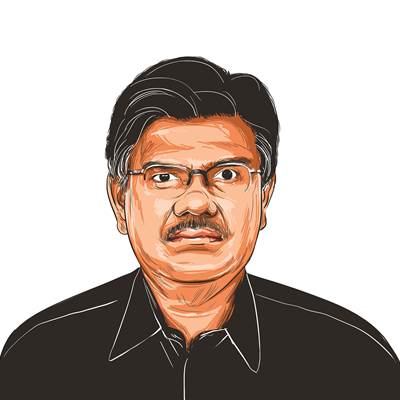Opinion How we can protect migrant workers
As much as the country of destination, the country of origin is responsible for the current situation. A regional alliance between South Asian and Gulf countries is the only way to stop the exploitation of low-skilled migrant worker
 Due to the massive reporting of labour rights violations and criticism of the Kafala system, GCC countries are trying to reform labour laws. (Express/File)
Due to the massive reporting of labour rights violations and criticism of the Kafala system, GCC countries are trying to reform labour laws. (Express/File) The stories of exploitation and labour violations faced by Indian workers in the Gulf countries should be looked at — based on the reports and editorials published in The Indian Express about deaths in Qatar over the last few days — by remembering the five-decade history of migration to the region. The exploitation of migrants led Parliament to enact the Emigration Act of 1983. Globally, India ranks as number one in terms of international migrants and remittances and six countries in the Gulf alone account for close to 50 per cent of Indian migrants. As per the latest Kerala Migration Survey (2018), close to two million Keralites reside in the Gulf. Most often, policymakers discuss the ills of the infamous “Kafala” or sponsorship system in the Gulf that enables employers to wield significant power over the lives of migrant workers.
Over the last three decades, stakeholders at the international, regional and national levels have discussed the labour rights violations in destination countries, particularly the Gulf. However, the vulnerabilities of migrant workers, especially those doing low-skill jobs, remain the same. One of us (Irudaya Rajan) found this during his first interaction with migrant workers in the UAE in 2001 as part of the first study financed by the Department of Non-Resident Keralite Affairs (NORKA), Government of Kerala. More recently, the media offered wide coverage of labour rights violations at three events — the Dubai Expo, the construction of stadiums for the Qatar world cup and the Covid pandemic.
Gulf Cooperation Council (GCC) countries have been accused of not providing healthcare services, employment and social protection for workers during Covid-19. The lack of access to healthcare services and the absence of health service firewalls for undocumented migrants created panic and led to large-scale repatriation during the pandemic. The campaign carried out by the Migrant Forum in Asia and its partners such as the International Institute for Migration and Development reveals the extent of wage theft in the GCC-South Asia region. The Return Migration Survey conducted among 2,000 Vande Bharat returnees to Kerala by Irudaya Rajan revealed that among 47 per cent who lost their jobs, 39 per cent have reported non-payment of wages and reduction in wages. Similarly, during the Dubai Expo 2020, there were several reports of non-payment of wages, contract violations and intimidation of workers.
Perhaps the most important example of labour rights violations in the GCC is from the construction of stadiums for the football World Cup to be held in Qatar. The concerns over the rights violations and deaths of migrant workers during construction continue to be widely discussed. As per the reports published by The Guardian, 6,500 migrant workers from South Asia have died in Qatar in the last 10 years, mainly after the commencement of construction projects in 2010 for the upcoming World Cup. The highest death count was of Indians — 2,711 workers — followed by migrants from Nepal, Bangladesh, Pakistan and Sri Lanka. Among the deceased, 69 per cent reportedly died due to natural causes. Even if the figures exaggerate the actual number of deaths at construction sites, the testimonials from returning migrants underline the deaths that take place due to the lack of occupational safety and health measures. A repatriated migrant worker from the Gulf told us: “Covid-19 was an opportunity for us to show the world how bad the conditions are for a low-skilled worker in Gulf, especially in the labour camps. But I am sure that our issues will be forgotten once the lockdown restrictions are lifted.”
Due to the massive reporting of labour rights violations and criticism of the Kafala system, GCC countries are trying to reform labour laws. Much of this is symbolic and tries to project the region as migrant-labour friendly. Simultaneously, the countries are also implementing nationalisation policies, which could lead to forceful job termination. However, the changes should be seen as a positive sign on the road to abolishing Kafala and other anti-labour laws.
Signs of progress are visible in processes like the Abu Dhabi Dialogue, a regional forum for cooperation between Asian countries that are the origin of and destination for labour. The forum is keen on developing information orientation programmes for workers, promoting technology platforms, and reforms in domestic workers’ laws.
As much as the country of destination, the country of origin is responsible for the current situation. Civil society and governments often react to these issues only when a large-scale violation of labour rights is reported. As a key player in the South Asia-GCC migration corridor, India should serve as a role model for South Asia. However, our efforts for migrant welfare are often limited to “repatriation exercises” during the crisis. The lethargy in tabling the draft Emigration Bill of 2021 (originally drafted in 2019) indicates the approach towards migrant workers, especially low-skilled workers.
The existing MoUs with GCC countries on domestic workers’ recruitment and prevention of irregular recruitment have had very little impact. Historically, India’s response to the grievances of migrant workers has been poor. However, in recent years the government portal “Madad” has enabled migrant workers from the country to file their grievances. According to the Ministry of External Affairs website, about 95 per cent of the registered grievances were resolved.
The bottlenecks in the countries of destination and origin imply a need for a joint effort to address the issues of migrants rather than playing a blame game during situations like the pandemic and migrant deaths. A review of the implementation of GCM objectives in the recently concluded International Migration Review Forum indicates that the governments are nowhere near developing a collective conscience on global labour mobility. India should play a leading role in building regional alliances in the South Asia-GCC corridor. A joint effort of all stakeholders including government, trade unions, recruitment agents and civil society can bring notable changes.
Irudaya Rajan and Akhil are Chair and Research Fellow respectively at International Institute of Migration and Development, Kerala





